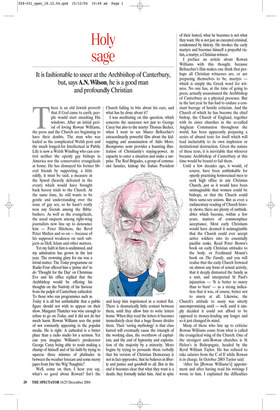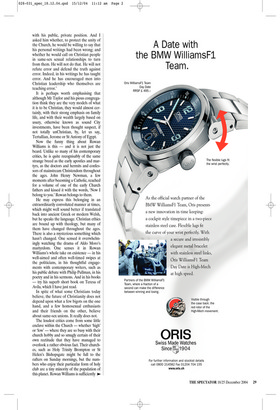Holy sage
It is fashionable to sneer at the Archbishop of Canterbury, but, says A.N. Wilson, he is a good man and profoundly Christian There is an old Jewish proverb that if God came to earth, people would start smashing His windows. After an initial period of loving Rowan Williams, the press and the Church are beginning to have their doubts. The man who was hailed as the complicated Welsh poet and the much longed-for Intellectual in Public Life is now a Welsh Windbag who can control neither the openly gay bishops in America nor the conservative evangelicals at home. He has dismayed his former liberal friends by supporting, a little oddly, it must be said, a measure in the Synod (heavily defeated in the event) which would have brought back heresy trials to the Church. At the same time, he still wants to be gentle and understanding over the issue of gay sex, so he hasn’t really won any friends among the Biblebashers. As well as the evangelicals, the usual suspects among right-wing journalists now line up to denounce him — Peter Hitchens, the Revd Peter Mullen and so on — because of his supposed weakness on such subjects as Hell, Islam and other matters.
Yet my faith in him is undimmed, and my admiration has grown in the last year. The crowning glory for me was a trivial matter. The Today programme on Radio Four offered him a ‘prime slot’ to do ‘Thought for the Day’ on Christmas Eve and his office replied that the Archbishop would be offering his thoughts on the Nativity of his Saviour from the pulpit of Canterbury cathedral. To those who run programmes such as Today it is all but unthinkable that a public figure should not wish to appear on their show. Margaret Thatcher was wise enough to refuse to go on Today, and it did not do her much harm. Rowan Williams sees the point of not constantly appearing in the popular media. He is right. A cathedral is a better place than a radio studio for a sermon. Yet can you imagine Williams’s predecessor George Carey being able to resist making a chump of himself and of his faith by trying to squeeze three minutes of platitudes in between the weather forecast and some merry japes from Jim ‘the Wig’ Naughtie?
Well, come on then, I hear you say, what’s so good about Rowan? Isn’t the Church falling to bits about his ears, and what has he done about it?
I was meditating on this question, which concerns the successor not just to George Carey but also to the martyr Thomas Becket, when I went to see Marco Bellocchio’s extraordinarily powerful film about the kidnapping and assassination of Aldo Moro. Buongiorno, notte provides a haunting illustration of Christianity’s staying-power, its capacity to enter a situation and make a surprise. The Red Brigades, a group of communist fanatics, kidnap the Italian President and keep him imprisoned in a rented flat. There is dramatically little contact between them, until they allow him to write letters home. When they read the letters it becomes immediately clear that a huge fissure divides them. Their ‘saving mythology’ is that class hatred will eventually cause the triumph of the working class, the overthrow of capitalism, and the end of hypocrisy and exploitation of the majority by a minority. Moro begins by trying to persuade them verbally that his version of Christian Democracy is not in fact oppressive, that he believes in liberty and justice and goodwill to all. But in the end it becomes clear that what they want is a death; they formally indict him. And in spite of their hatred, what he becomes is not what they want. He is not just an executed criminal, condemned by history. He invokes the early martyrs and becomes himself a prayerful victim, a martyr, a Christian witness.
I preface an article about Rowan Williams with this thought, because Bellocchio’s film makes one think that perhaps all Christian witnesses are, or are preparing themselves to be, martyrs which is simply the Greek word for witness. No one has, at the time of going to press, actually assassinated the Archbishop of Canterbury as a physical presence. But in the last year he has had to endure a constant barrage of hostile criticism. And the Church of which he has become the chief bishop, the Church of England, together with its sister churches in the so-called Anglican Communion throughout the world, has been apparently preparing a series of absurd tests for itself which will lead ineluctably to its own implosion or institutional destruction. Given the nature of these tests, it is inevitable that whoever became Archbishop of Canterbury at this time would be bound to fail them.
Until a few decades ago, it would, of course, have been unthinkable for openly practising homosexual men to seek high office in any Christian Church, just as it would have been unimaginable that women could be bishops, or that the Church could bless same-sex unions. But as even a rudimentary reading of Church history shows, there are plenty of unthinkables which become, within a few years, matters of commonplace acceptance. Most early Christians would have deemed it unimaginable that the Church could ever accept active soldiers into its essentially pacifist ranks. Read Peter Brown’s book on early Christian attitudes to the body, or Ferdinand Mount’s book on The Family, and you will realise that the early Church frowned on almost any form of sexual activity, that it deeply distrusted the family as a unit, and interpreted St Paul’s injunction — ‘It is better to marry than to burn’ — as a strong indication that it was, of course, better not to marry at all. Likewise, the Church’s attitude to usury was utterly uncompromising until — well, until it simply decided it could not afford to be opposed to money-lending any longer and so it just changed its mind.
Many of those who line up to criticise Rowan Williams come from what is called the evangelical wing of the Church. One of the strongest anti-Rowan churches is St Helen’s in Bishopsgate, headed by the Revd William Taylor. He has refused to take salaries from the C of E while Rowan is in charge. In October 2003 Taylor said: ‘After his [Rowan Williams’s] appointment and after having read his writings I wrote to him. I explained the difficulties with his public, private position. And I asked him whether, to protect the unity of the Church, he would be willing to say that his personal writings had been wrong; and whether he would call on Christian people in same-sex sexual relationships to turn from them. He will not do that. He will not refute error and defend the truth against error. Indeed, in his writings he has taught error. And he has encouraged men into Christian leadership who themselves are teaching error.’ It is perhaps worth emphasising that although Mr Taylor and his pious congregation think they are the very models of what it is to be Christian, they would almost certainly, with their strong emphasis on family life, and with their wealth largely based on usury, otherwise known as sound City investments, have been thought suspect, if not totally unChristian, by, let us say, Tertullian, Jerome or St Antony of Egypt.
Now the funny thing about Rowan Williams is this — and it is not just the beard. Unlike so many of his contemporary critics, he is quite recognisably of the same strange breed as the early apostles and martyrs, as the doctors and hermits and confessors of mainstream Christendom throughout the ages. John Henry Newman, a few moments after becoming a Catholic, reached for a volume of one of the early Church fathers and kissed it with the words, ‘Now I belong to you.’ Rowan belongs to them.
He may express this belonging in an extraordinarily convoluted manner at times, which might well sound better if translated back into ancient Greek or modern Welsh, but he speaks the language. Christian ethics are bound up with theology, but many of them have changed throughout the ages. There is also a mysterious something which hasn’t changed. One sensed it overwhelmingly watching the drama of Aldo Moro’s martyrdom. One senses it in Rowan Williams’s whole take on existence — in his well-aimed and often well-timed swipes at the politicians, in his thoughtful engagements with contemporary writers, such as his public debate with Philip Pullman, in his poetry and in his sermons. And in his books — try his superb short book on Teresa of Avila, which I have just read.
In spite of what some Christians today believe, the future of Christianity does not depend upon what a few bigots on the one hand, and a few homosexual enthusiasts and their friends on the other, believe about same-sex unions. It really does not.
The loudest critics come from some little enclave within the Church — whether ‘high’ or ‘low’ — where they are so busy with their church hobby and so smugly certain of their own rectitude that they have managed to overlook a rather obvious fact. Their churches, such as Holy Trinity Brompton or St Helen’s Bishopsgate might be full to the rafters on Sunday mornings, but the numbers who enjoy their particular form of holy club are a tiny minority of the population of this planet. Rowan Williams is sufficiently intelligent and normal to be aware that in the West, being religious these days is, outside America, very distinctly odd, and trying to defend Christianity against the whole ethos of materialism and scientific rationalism which most intelligent people take for granted is a more than intellectual task. We might very well be living in Christianity’s last days. Many of us who go to church do so a little wistfully, knowing that, unlike Rowan Williams, we do not believe in the ways which our ancestors did. ‘Our prayers so languid and our faith so dim’ is one of the few lines of a hymn which we could sing with gusto. ‘Fightings within and fears without’ might be another.
Yes, Rowan Williams brings cleverness and originality and subtlety to public debate, and those are not qualities to be sneezed at, even if they are repellent to so many bigots in the press and the Church. But he also has a quality which can’t be faked and which is always shown in the life and death of a martyr: holiness. When the last church on earth has closed, that will be the quality which the human race will most miss about the days of faith. The only tests Rowan is failing as Archbishop are ones not worth posing: silly posturings on both sides about homosexuality or women priests. In all the essential things, he is just what the Church and the nation most need. Of course, when it has a godsend, what does the Church of England do? It calls for his resignation.



















































































 Previous page
Previous page